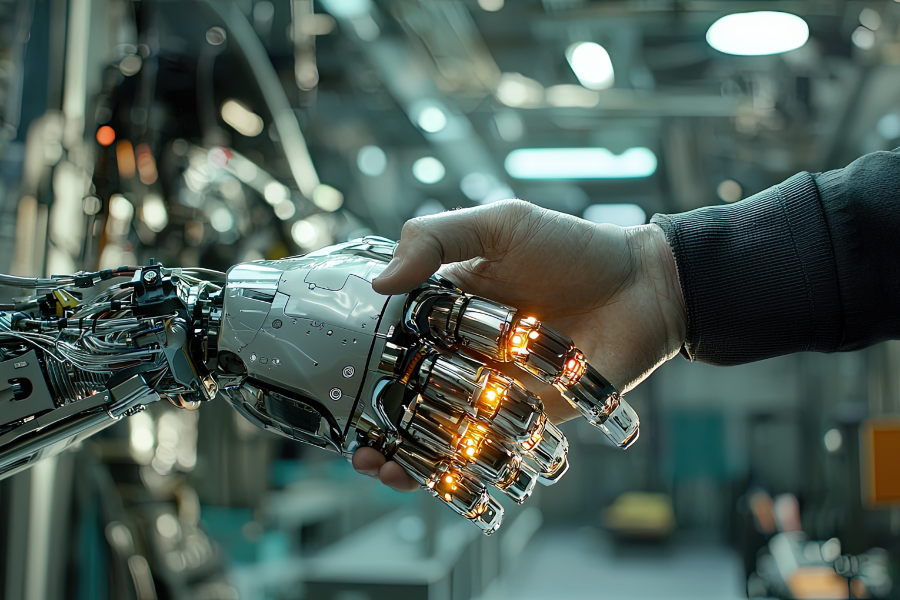
AI Agents unlock new opportunities in design, production, and supply chain management
AI agents represent the next step in the application of artificial intelligence. While traditional AI supports decision-making by analyzing data, an AI agent operates independently to perform specific tasks or achieve defined goals. How can the potential of AI agents be harnessed, for example, in customer-specific design, cost estimation, production, or logistics?
An AI agent can monitor its environment, assess situations, propose or execute actions, and communicate with other systems and agents. Leveraging AI agents opens new possibilities for improving the operations of industrial companies as well.
Supporting customer-specific deliveries with design and solution configuration
Designing tailored solutions requires fast but precise configuration based on the customer’s individual requirements, such as capacity needs, space constraints, and intended use. An AI agent can assist design engineers by analyzing input data and producing an initial equipment configuration using the company’s modular product information.
Agent-assisted operations significantly reduce lead times in pre-design phases and enable the exploration of multiple alternative solutions early in the process. For example, a company designing equipment deliveries can use an AI agent to accelerate the planning of customer-specific assemblies from days to mere hours.
Automating cost estimation and profitability assessment
Agent-based cost estimation can utilize data generated by a design agent and combine it with up-to-date information on material costs, subcontracting prices, inventory levels, and production capacity. Based on this, the AI agent calculates the total solution cost and proposes pricing that is both profitable and competitive.
A key advantage of an AI agent is its ability to quickly update calculations based on changing conditions, ensuring that the proposal is not only accurate but also genuinely up-to-date. Additionally, the agent can generate multiple pricing scenarios based on customer priorities, such as speed or cost.
Proactive supply chain optimization
An AI agent can support supply chain management by monitoring inventory levels, order backlogs, transportation routes, and external risks such as weather conditions or supplier disruptions. The agent can propose proactive actions, such as rerouting orders, adjusting stock levels, or modifying delivery schedules.
The agent can also directly communicate with subcontractor systems and negotiate updates to delivery terms automatically if conditions change. For example, if a supplier reports delays, the agent can automatically arrange alternative delivery routes and optimize schedules to minimize the impact on the customer. This reduces manual work and enables dynamic supply chain management in ways not previously possible.
Monitoring production processes and predictive maintenance
In industrial production facilities, an AI agent can be part of production monitoring by tracking real-time sensor data, operational information, and maintenance records. The agent learns the normal operation patterns of the facility and detects deviations before actual disruptions occur.
For instance, the agent can propose actions to the maintenance team, create service requests, or even automate spare part orders. Such a system enables predictive maintenance to be implemented without requiring constant manual monitoring. As a result, the number of production disruptions decreases, and downtime management improves.
Collaboration between agents: Toward a self-directed production system
AI agents become particularly interesting when they can communicate with each other. For example, a design agent can confirm with a production agent whether the proposed configuration can be manufactured with existing capacity. Meanwhile, a logistics agent can optimize the delivery schedule and prepare for potential deviations.
This system-level collaboration facilitates information flow across traditional functional silos and lays the groundwork for a self-directed production environment where design, production, and supply chains operate in a synchronized and proactive manner.
A smarter industry with AI agents
AI agents provide industrial companies with concrete tools to enhance operations and respond quickly to rapidly changing business environments. They can shorten lead times for customer-specific designs, improve the accuracy and competitiveness of proposals, optimize production efficiency, and flexibly manage supply chains.
The adoption of agents does not require complete automation or overhauling existing systems—they can be phased in to support existing processes. In this way, they serve not only as a technological innovation but also as a tool for continuous operational improvement. By integrating AI agents into industrial workflows, companies can achieve smarter and more efficient operations.

Joona Peni
Solution Sales
joona.peni@atostek.com
+358 44 901 2409